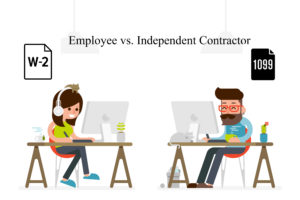California’s Assembly Bill 5, better known as AB5, went into effect on January 1, 2020 and has drastically changed how employers can classify employees vs. contractors. Now, the state’s Supreme Court “ABC test” is the gold standard for determining if a person qualifies as an independent contractor while abiding by the California Labor Code, Industrial Welfare Commission Wage Orders, and California Unemployment Insurance Code. Has your classification system passed the ABC test? If you haven’t taken a close look at how you’re classifying contractors vs. employees, you’re putting yourself and your company at a big risk—especially now that AB5 is in effect. When an employee is misclassified, employers could be found in violation of requisite unpaid overtime, and might even be failing to follow minimum wage laws and regulations. Steep consequences can follow including high penalties, lawyer fees, and in some cases criminal liability. Misclassification… [Read More]
Differences between an Employee vs. Independent Contractor
Every so often, I get the question from clients regarding proper classification of employee vs. independent contractor. Part of the reason why these questions are constantly being asked is that the exact definition of independent contractors vs. employees is not set in stone. Interpretation of laws and principals can provide a guide to employers in defining the business relationship between themselves and the candidate. As rule of thumb, I always use three sources when trying to answer these difficult questions. To define the status of an independent contractor, I refer to common laws and principals adopted by the federal government and the states, the Fair Labor Standards Act of 1938, and, finally, I take into account the decisions made by the courts. Especially in my home state of California, the third source of information gives me a road-map of what’s established as precedence from the… [Read More]
The Myths of Independent Contractor misclassification.
We are all aware of the potential financial penalties that Independent Contractor (IC) or contract worker misclassification can bring to a company, some have even experienced it. This misclassification can be particularly debilitating to a company’s bottom line, and thoughtful risk mitigation policies need to be established. Based on testimonials from our current clients, potential clients, and industry veterans, a number of practices aimed at reducing misclassification risk have been implemented by well-intentioned organizations. Do they work? Well, not all of them, but some work very well. Others work only in combination, while some are simply myths. For a variety of reasons, these myths are embraced and can be difficult to dispel. Consulting with 1099 compliance professionals can help, but before we get into that let’s meet the myths through the eyes of a hiring manager. Myth #1: Contractor is Incorporated Some view articles of… [Read More]


